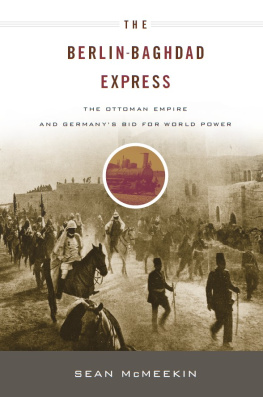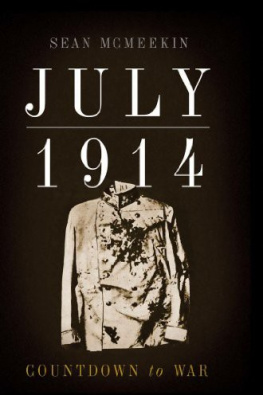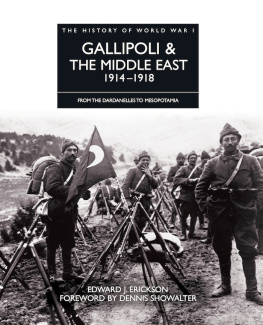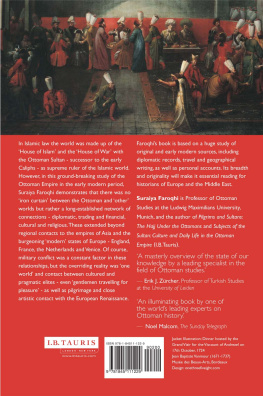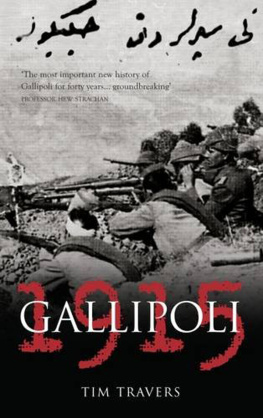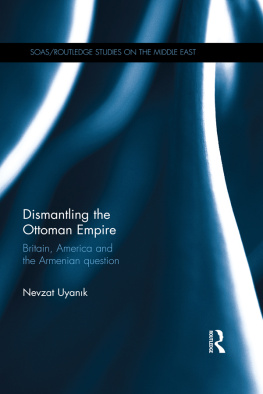The Berlin-Baghdad Express
The Ottoman Empire and Germanys Bid for World Power
Sean McMeekin
The Belknap Press of Harvard University Press Cambridge, Massachusetts 2010
Copyright 2010 by Sean McMeekin All rights reserved Printed in the United States of America
First published in the United Kingdom by Penguin Books Ltd. 2010
Cataloging-in-Publication Data is available from the Library of Congress
ISBN 978-0-674-05739-5 (cloth : alk. paper)
For Nesrin
Some day, when the full history is written - sober history with ample documents - the poor romancer will give up business and fall to reading Miss Austen in a hermitage.
John Buchan, Greenmantle (1916)
List of Abbreviations
AVPRI Arkhiv vneshnei politiki Rossiiskoi Imperii (Archive
of the Foreign Policy of the Russian Empire), Moscow, Russia BOA Basbakanlk Osmanl Arsivleri (Ottoman
Government Archive), Sultanahmet, Istanbul, Turkey DBB Deutsches Bundesarchiv Berlin, Lichterfelde,
Berlin, Germany EJP Ernst Jackh Papers, Yale University, New Haven,
Connecticut
GPA Geheimes Preussisches Staatsarchiv, Berlin, Germany
HHSA Haus-, Hof-und Staatsarchiv, Vienna, Austria
KW Kriegsarchiv Wien, Vienna, Austria
MvO Max von Oppenheim Stiftung, Sal. Oppenheim jr. &
Cie KGaA, Cologne, Germany NA National Archives of the United States (NA),
US Embassy, Ankara, Turkey PAAA Politisches Archiv des Auswartigen Amtes,
Berlin, Germany PRO National Archives of the United Kingdom
(formerly Public Record Office), Kew Gardens, London, United Kingdom*
* Although it has been several years now since the Public Record Office was renamed the National Archives of the United Kingdom, I do not know of a single researcher who refers to it by the new name. For the sake of tradition and to preserve common currency, I continue to reference it in this book as the PRO.
xill
QO
RGVIA
Quai dOrsay Archives, Paris, France Rossiiskii Gosudarstvennyi Voenno-Istoricheskii Arkhiv (Russian Government Military-Historical Archive), Moscow, Russia
A Note on Names and Translations
With apologies to my Turkish friends, I have generally gone with Constantinople, as it was still called in the pre-First World War and wartime era, even by Ottoman government officials, unless I am talking about the city today, in which case it is indeed Istanbul. Living in Ankara myself, I could not, however, countenance using the classical Angora, much as I like the sound of it. With most other cities I have used the contemporary form with modern usage in parentheses, thus Adrianople (Edirne) or skp (Skopje). Todays St Petersburg was likewise St Petersburg until 31 August 1914, after which date Peters Germanic sounding city was Slavicized as Petrograd (in the current narrative, we do not have to contend with its years as Leningrad).
With regard to Turkish spellings, I have generally rendered the c as dj (as in Djavid and Djemal) and used the dotless where appropriate (it sounds a bit like uh) to differentiate from the Turkish i, which sounds like ee. Likewise, I have tried to render properly s (sh) and (ch) to add Turkish flavour to the text, even if these letters are really post-1928 concoctions of Atatrks language reforms. It is impossible to be consistent in all these things; may common sense prevail.
All translations from the French, German, Russian and Turkish, unless otherwise noted, are my own.
Acknowledgements
Two writers above all deserve recognition for having inspired this book: John Buchan, author of the great First World War yarn Greenmantle, and Peter Hopkirk, who did the first serious exploration of the Turco-German jihad in English, in On Secret Service East of Constantinople. If I have sometimes picked nits with Hopkirks reasoning or sourcing, it is only by way of honouring his achievement in bringing the story behind Greenmantle to life. I have enjoyed all of Hopkirks books on Great Game intrigue in Asia. Let this book serve as homage to a wonderful writer whose gift for storytelling has been an inspiration to me, however far I fall short of his fine example.
I should also confess a scholarly debt to Jonathan McMurray, on whose fine recent study of the Baghdad railway, Distant Ties, I have drawn heavily; and to Mustafa Aksakal, who was kind enough to let me read his groundbreaking and as yet unpublished article on Ottoman jihad declarations, The Trained Triumphant Soldiers of the Prophet Muhammad. Holy War and Holy Peace in Modern Ottoman History. Likewise, Michael Reynolds of Princeton University has generously shared with me his forthcoming article Buffers, not Brethren: Young Turk Military Policy in World War One and the Myth of Panturanism, along with his still unpublished dissertation on The Ottoman-Russian Struggle for Eastern Anatolia and the Caucasus, 1908-1918. Mike Reynolds is a fantastic scholar, whose work in this little-known field deserves much wider circulation than it has thus far received.
The project out of which this book grew could not have been undertaken without generous financial support from the Alexander von Humboldt Foundation. I would like to thank Georg Schtte at Humboldt headquarters for his continued support, along with Heinz Kramer, my gracious host at the Stiftung Wissenschaft und Politik. My stay in Germany was made much more pleasurable by the hospitality of Anna Kossatz and Heiko Kosel (in Cottbus), Tom Grant (in Heidelberg), Jan Dirk Kemming (in Cologne), and Gereon Manzel (in Berlin). Since 2008, I have also been able to exploit the wonderful Sterling library at Yale, thanks to the generosity of International
Security Studies and the Brady-Johnson Program in Grand Strategy. For this, heartfelt thanks to Professors John Gaddis, Paul Kennedy and Charlie Hill for inviting me and providing such excellent facilities in which to work, along with stimulating company.
Among the many fine archivists who facilitated my work, I must single out for special praise Mareike Fossenberger of the Politisches Archiv des Auswar-tigen Amtes in Berlin. Yes, dear Mareike, I confess proudly to being an Akten-fresser; and I could not have devoured so many files without your help. Likewise Dr Leopold Auer, Director of the Haus-, Hof- und Staatsarchiv in Vienna, whose informative invitation allowed me to begin plugging away as soon as I arrived, and Joachim Tepperberg, who helped me photocopy huge reams of files with a very quick turnaround time. Betil Gurun of the US Embassy archives in Ankara was a delightful host each time I took the Bilkent bus downtown.
At the Oppenheim Bank archive in Cologne, Thorsten Maentel was tireless in retrieving old files and processing my photo requests. Gabriele Teichmann was gracious enough to share her tremendous expertise on all things Max von Oppenheim, and to allow me to lunch in the bank cafeteria. If I come to somewhat different conclusions about the Baron than Teichmann, I should emphasize that I find Oppenheim equally interesting and by no means unsympathetic as a character. In any case, I would not have been able to write my book without Teichmanns help - and her own study of the Baron.
At Bilkent, I am grateful to Ali Dogramaci, Abdullah Atalar and Ali Kara-osmanoglu for their continued support. Muge Keller and Nilfer Gen often went well beyond the call of duty with logistical support for my research trips. James Alexander and Sandy Berkovski helped tighten and discipline my ideas. Hasan Ali Karasar introduced me to Turkish government archives: reading the document registers I would have been literally lost without him. I would have been even more lost without the Ottoman Turkish expertise of Abdrrahim zer, who generously transliterated more than a dozen documents for me from the Basbakanlk Osmanl Arsivleri, and helped me poke my own way through a dozen more. Onur nol unearthed the wonderful Djemal quote footnoted in chapter 18. Ian Sherwood was a fantastic host, as always, in Istanbul. Bilge Criss shared her encyclopaedic knowledge of Ottoman Turkish history, including her cavernous personal library. Norman Stone has been a part of this project from the beginning. Norman helped in the deciphering of several handwritten letters, and read through the entire manuscript. Of course he bears no responsibility for the final result. The same goes double for Peggy Anderson of Berkeley, who continues to be a close and careful reader of my work, even if she does not always agree with me on the fine points. Back home in the States, my sister Michele has been a constant source

